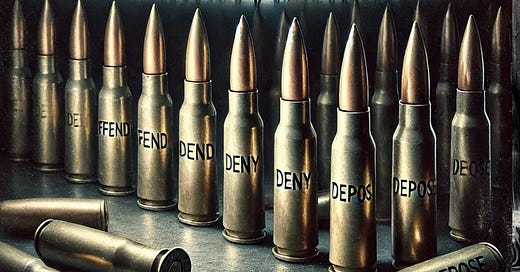Let’s set the scene:
I am in my bed, tuned into Law and Order: SVU (yes, I refuse to give up this copaganda show). As I watch yet another rerun—because they’re on a mid-season break—I’m scrolling through the internet, absorbing the memes and reactions that seem to multiply by the second. It’s in this strange juxtaposition, as Carisi attempts to negotiate his way out of a hostage situation on screen and the internet revels in collective camaraderie over a real-life killing, that I pause.
This isn’t just another social media moment. The raw, unapologetic celebration of the death of a United Healthcare executive is everywhere, cutting across political lines in a way that almost nothing else seems to. And it’s in this surreal moment, between the fictional drama and the very real online discourse, that I sit and think about what this says about us—about a nation so divided, yet suddenly united, in its rage against one man who symbolizes so much more.
A Legacy of Systemic Harm
To understand the reactions to this moment, we must first acknowledge its roots in history. For decades, the U.S. healthcare system has operated as a for-profit machine, prioritizing corporate growth over human lives. Managed care models, rising premiums, and denied claims have built a system that feels inherently exploitative.
This exploitation disproportionately impacts marginalized communities. Black and Indigenous women face alarming maternal mortality rates. Disabled individuals battle constant barriers to equitable care. Queer and trans people are frequently denied affirming treatments. For these communities, the healthcare system has not been a safety net—it has been a constant source of grief and trauma.
What we’re witnessing now is not just rage at one executive. It is the culmination of generational harm, of systemic inequities compounded over time. It’s the grief of millions, channeled into one visceral, collective moment.
The Grief Beneath the Rage
It’s fitting that this moment coincides with Grief Awareness Week because the public’s reaction—raw, unapologetic, and darkly humorous—feels like the shadow side of grief. For many, grief is not just about mourning loved ones lost due to inaccessible care; it’s also about mourning the futures they could have had if their humanity had been valued.
Grief, especially when disenfranchised or unacknowledged, often morphs into rage. And when that grief is systemic—woven into policies that dictate who gets to live and who doesn’t—it becomes a collective burden. This is what we see now: the grief of a nation forced to laugh at its own suffering to keep from breaking under its weight.
Gallows Humor: Laughter as a Last Refuge
The memes and jokes that have proliferated in response to this event are a prime example of gallows humor—a coping mechanism for those confronting overwhelming systems of oppression. This kind of humor is not dismissive; it is a form of defiance, connection, and relief.
Defiance: Laughter becomes a way of saying, “You cannot take everything from us.”
Connection: Dark humor builds camaraderie among those who share similar frustrations, creating a collective voice for grief and anger.
Relief: When other outlets feel inaccessible or ineffective, humor offers a pressure valve, allowing people to process their emotions in small, manageable doses.
Yet gallows humor also underscores a harsh reality: the systems that should be helping us heal are the very systems causing harm. When people turn to humor in the face of profound injustice, it signals that traditional paths to justice and accountability are failing.
Deny, Defend, Depose: Words with Dual Meaning
The words Deny, Defend, Depose—etched into the ammunition reportedly used in the killing—offer a chilling yet poignant reflection of the healthcare system itself:
Deny: Deny claims, care, and humanity.
Defend: Defend profits, policies, and systems of oppression.
Depose: Depose accountability and reject challenges to the status quo.
But in this moment, those words have been reclaimed:




